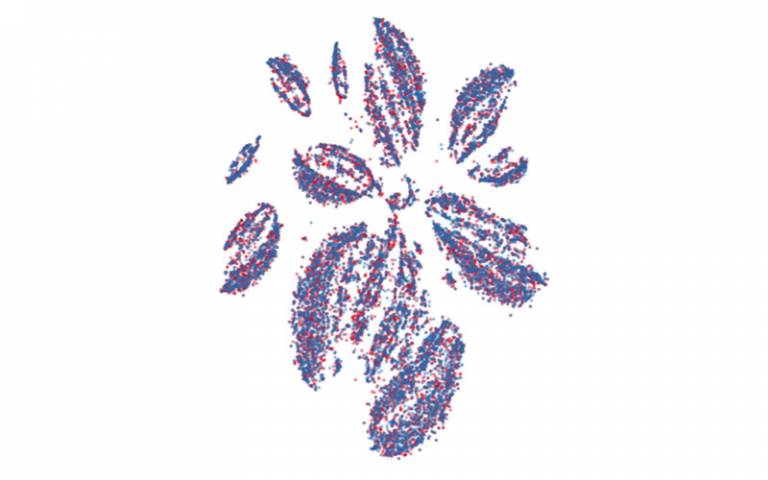Our iBSc Mathematics, Computers and Medicine capitalises on the wealth of interdisciplinary research at UCL.

A revolution in data acquisition, storage and computational analysis is transforming both biomedical research and medical care in the 21st century. This interdisciplinary iBSc, which has been running since 2018/2019, aims to train a cohort of doctors who will be at the vanguard of implementing and exploiting these exciting changes.
The iBSc is delivered by a partnership between the Division of Infection and Immunity (Faculty of Medical Sciences) and the Department of Computer Sciences (Faculty of Engineering). Both departments run world-class research and teaching programmes.
Our scientists, many with international reputations for research excellence, are committed to research–led teaching and you will have the opportunity to meet many of them during the course.
Learning outcomes
- An appreciation that quantitative approaches can be applied to ANY branch of medicine.
- An opportunity to carry out research at an interdisciplinary frontier of medicine.
- The confidence to exploit mathematics and computers to advance biomedical research and improve patient care.
Key information and entry
Duration
1 year integrated BSc [Year 3: Medicine MBBS BSc]
Entry requirements
Available to Year 3 students studying the Medicine MBBS BSc. An “A” in A level mathematics or equivalent is required.
Structure
The degree consists of four compulsory core modules, one optional module, and a research project. The research project (INIM0038) will provide first-hand experience at the research interface between biomedical laboratory-based research and mathematical and computational analysis.
Projects may be supervised by appropriate individuals from across the range of UCL faculties; the choice of project will be carried out in discussion with the module lead at the beginning of term 1.
- Compulsory modules
- Introductory Programming (COMP0066, Term 1)
- Mathematical Methods in Medical Physics (MPHY0017, Term 1)
- Mathematical Modelling in Biomedicine (INIM0004, Term 2)
- Machine Learning for Domain Specialists (COMP0142, Term 2)
- Optional modules
- Cellular Pathology (INIM0010, Term 1)
- Cellular and Developmental Neurobiology (CELL0003, Term 1)
- Computing in Medicine (MPHY0020, Term 1)
- Evolution and Infectious Diseases (INIM0015, Term 2)
- Frontiers in Tuberculosis (INIM0046, Term 2)
- Global Eradication of Viruses (INIM0014, Term 2)
- HIV Frontiers from Research to Clinics (INIM0017, Term 2)
- The Immune System, Cancer, and its Treatment (INIM0031, Term 2)
- Immunodeficiency and Therapeutics (INIM0030, Term 2)
- Microbial Pathogenesis (INIM0013, Term 2)
- Viruses and Disease (INIM0012, Term 2)
- Advanced Molecular Biology: Genomics and Evolution (BIOL0025, Term 2)
- Cancer Biology (BIOC0017, Term 2)
- Functional Genetics of Model Systems (CELL0013, Term 2)
- Introduction to Biophysics (MPHY0006, Term 2)
- Visual Neuroscience (NEUR0017, Term 2)
- Examples of previous research project titles
- The impact of germline copy-number variation on somatic tumour evolution in non-small cell lung cancer
- Development of the robot maze system for the study of spatial memory in rodents
- Evaluating an automated machine learning model that predicts visual outcomes in patients receiving treatment for neovascular age-related macular degeneration
- Computational modelling of COVID-19: A study of compliance and superspreaders
- Characterising brain microstructure with combined diffusion-relaxometry MRI and machine learning
- Improved prediction of postoperative paediatric cerebellar mutism syndrome using an artificial neural network
Further information about individual modules can be found within the UCL Module Catalogue.
Alternative optional modules can be selected, but these should be discussed and agreed with the programme director.
Fees and funding
For further information about current tuition fees and funding support, visit the UCL Undergraduate Degrees website.
Apply
Second year medical students at UCL should submit their application through Moodle. Decisions are based on personal statements assessed by the programme director. UCL students are given priority and numbers are limited, but if there are spaces, external students may also apply.
For further information about the programme, please contact the teaching admin team (ii.infection-immunityadmin@ucl.ac.uk) or the programme director, Professor Benny Chain (b.chain@ucl.ac.uk).
Medical career
The iBSc Mathematics, Computers and Medicine offers students an invaluable opportunity to bridge the interdisciplinary gap between medicine, mathematics and computer science.
 Close
Close


